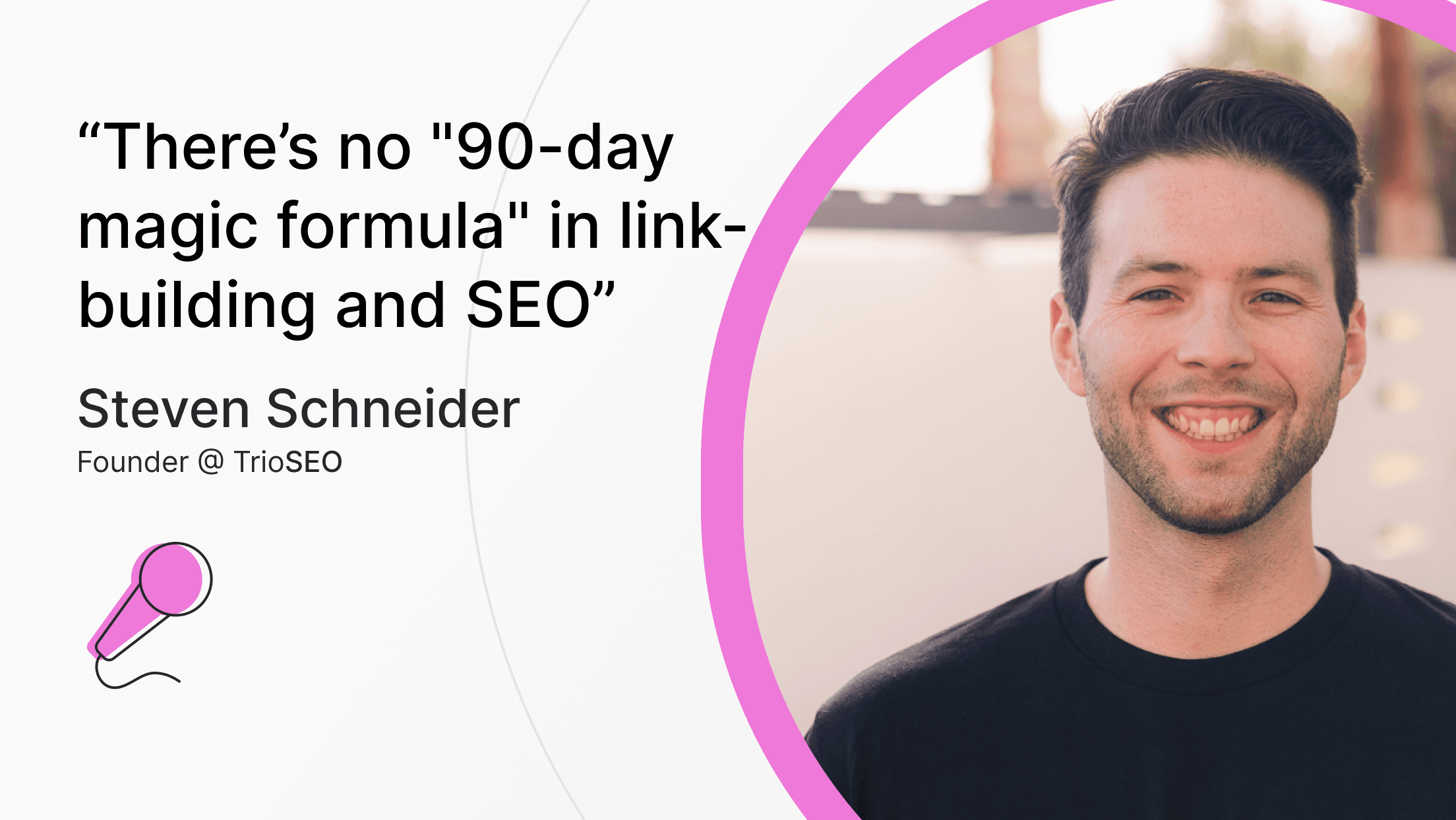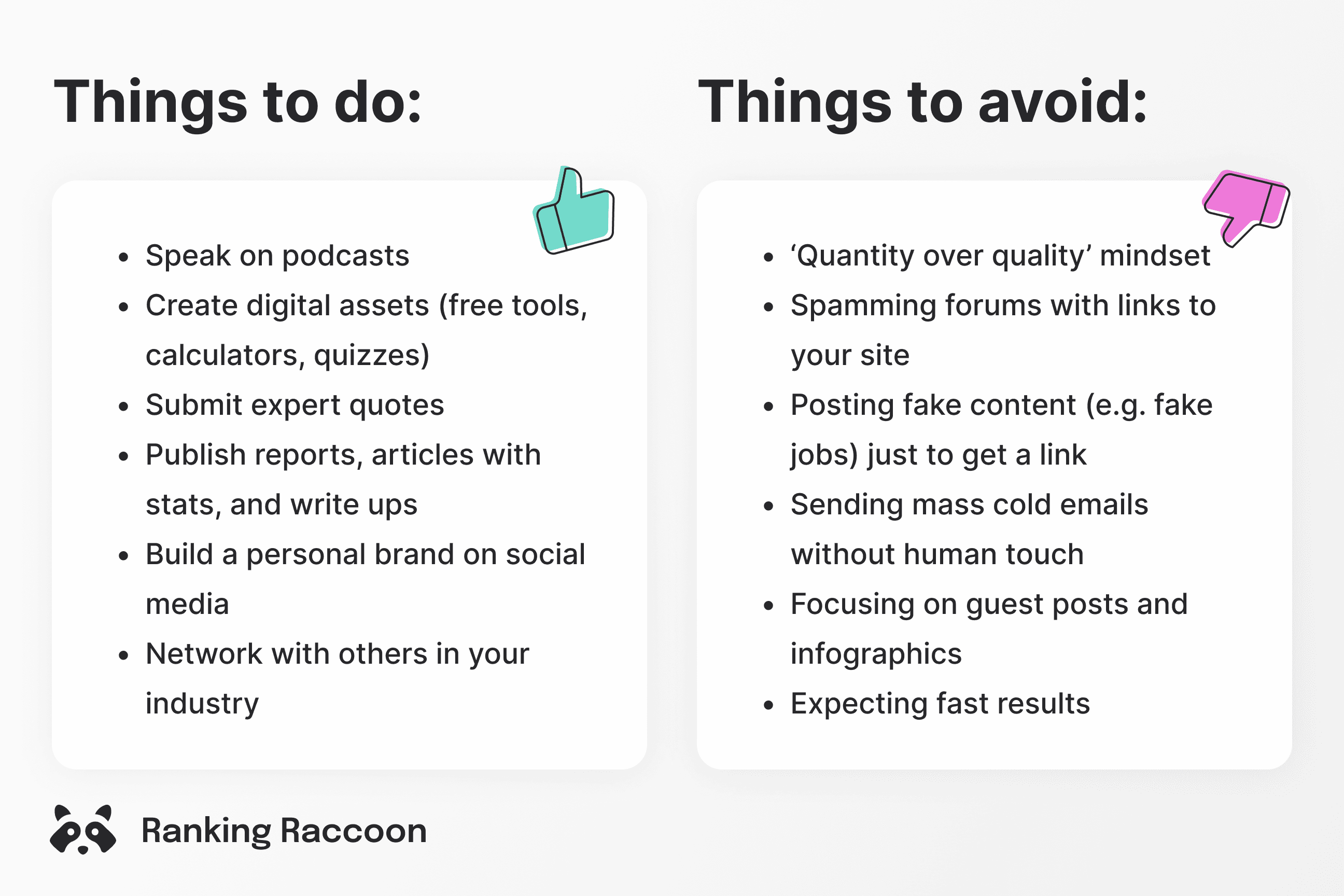"There's no magic formula in link-building": Interview with Steven Schneider

Natalia Toth
Why are podcasts a powerful link-building tactic that few take advantage of? Why are infographics not that efficient any more? Are cold emails a thing of the past, and what’s the better way to get backlinks?
Ranking Raccoon talked about this all with Steven Schneider, Co-Founder and CEO at TrioSEO, a monthly SEO services agency that helps online businesses drive high-intent organic traffic through bottom-of-the-funnel content.
Before TrioSEO, which he manages with his two partners, Connor Gillivan and Nathan Hirsch, Steven co-owned a portfolio of 40 blogs, managed 400 articles monthly, and scaled to 7 figures in annual revenue.
You can’t miss his insights!

Steven, this year has been a rollercoaster for the SEO community. What were the biggest changes and what shall we do?
The biggest thing is rising role of the page-to-page relevance and the quality of the page you're getting the link from.
Back in the day, SEOs used to follow the ‘quantity over quality’ approach. But now, more than ever, it's important to make sure that the sites that are linked together have relevance between them. I think Google's stepping up their game to make sure that users have the best experience. And the only way to achieve that is making sure that people play by the rules and play by the book.
"So in 2025, SEOs should definitely prioritize quality versus quantity of backlinks if they’re not doing it yet."
Steven Schneider
Co-Founder and CEO at TrioSEO
When it comes to link-building, what tactics worked best for you this year?
Podcasting is definitely my number one. It's probably the only one that I really focus on nowadays in terms of a time trade-off.
Guest posting still works, too, but it's very labor-intensive, resource-intensive, and time-intensive. It's not as scalable as it used to be, and it’s also more difficult to find trusted partners to do guest posts with.
I also really like digital assets, like calculators or quizzes. They work well — especially if you offer an embed code or something that allows people in your niche to leverage the tool on their own site without any risk of it impacting their business. It’s pretty common for widget platforms, but it has to kind of be more transparent: you should let people know that you’re getting backlinks from them.
Expert quotes are a good way to build links, too, because they’re normally low-effort. Finally, articles with stats, reports, and write ups also work well.
Read more: Link Building for SaaS: 10 Overlooked Strategies (+ 13 Do’s and Don’t’s)
What about the tactics you would not spend time on again?
Infographics. They were popular once, but they’re not as impactful today.
Personally, I've always just been hesitant to get multiple links from one type of media source. If you're passing out a single infographic and get 10-20 links to it, does that really appear natural?
Besides, the branding aspect is subjective. You put time and labor into the graphic, but my interpretation of a good visual is different from yours. So you can never be sure if your visual will end up being a link magnet.
We spoke about the less efficient tactics. What other no-no's in link-building can you name?
I’d steer away from trying to cheat the system with tactics like forum links. I even heard of people posting fake job posts trying to get backlinks.
Anything that seems shady shouldn’t be allowed. There will always be ways for people to try and cheat the system, but it’s not worth it in my opinion.

Link-building is a tricky area for sure. What's the biggest misconception people have about link-building?
I see many businesses still go after quantity versus quality because they know how important links are.
Links in general and SEO have this kind of holy grail shrine attached to their name, and it's very easy to get blinded by just having a backlink. Many forget that they need to do due diligence and vet the link.
Whenever you get a link, you should ask yourself,
- ‘Is this a good link for me? My users? My brand?’
Because people just need links to survive in SEO, sometimes that checklist gets put to the wayside.
Another misconception about link-building and SEO is expecting immediate results. Many approach it with a "90-day magic formula" mindset, thinking it will quickly transform their business. But
"SEO is a long-term investment that requires a commitment of at least 2 to 3 years. It’s about doing the small things consistently over time, rather than expecting instant success."
Read more: White Hat Link-Building: 8 Techniques for Growth (With Examples)
In today’s world of link-building, many marketers consider paid backlinks as a necessary evil. What’s your stance on paying for links?
It's a hard question. Paid links are a little bit of a grey area. Obviously, it's against Google's policy to pay for backlinks.
But I think that there's an asterisk on paying for backlinks.
"If you're just paying someone straight up, like, ‘I give you $500, and you put my link here,’ I would call this ill-advised."
However, if you’re paying a PR person or a journalist, you're paying them for their time and expertise to write an article about your company.
So, yes, by definition, you are buying that link, but you're also paying for the service that comes with it.
Many people are frustrated with cold emails, because they take a lot of time and the reply rate is mere 5%. What’s your stance on cold email outreach?
To me, cold emails are kind of a dead game, unless you’re playing a numbers game and send mass cold emails in addition to your primary method. I get a dozen emails a day that I just immediately block because of that lack of human touch. I feel like I'm just a number on your cold email outreach list or a template with an ‘Insert name’ field.
To me, the best way to go is social media. You can get a better feel for the person and their voice online, especially on LinkedIn. Personal brand aspect plays a huge role in the trust that goes into the link-building relationship.
We hear from many SEOs that it’s hard to measure the impact of link-building campaigns. Can you give some tips on evaluating the effect of link-building?
Honestly, it’s hard to pinpoint because SEO is a mixture of 10 million other variables. For example, if you do a technical SEO update, internal linking updates, adding content to the site and also building backlinks, it's difficult to isolate just one factor.
I'm sure many people would say to check the DR and DA, but these are just arbitrary, inflated metrics from SEMrush and Ahrefs. So it doesn't really matter from Google's point of view.
"The impact of link-building is less about tracking exact ROI and more about being consistent for the long term. SEO takes time, and to really have a machine that drives leads and results, you have to look at it over a multi-year time horizon."
I’d look at the baseline of where the site is for the last 30 or 60 days. You won't see the results immediately. After you start building links, wait another 30 days to give the links time to register.
Read more: Can't Measure Link-Building ROI? Read this (A 5 steps’ Guide)
Thanks for the awesome interview, Steven - here’s to personal connections, the ‘quality over quantity mindset’, and patience to see the results!

Natalia Toth
Marketing Manager